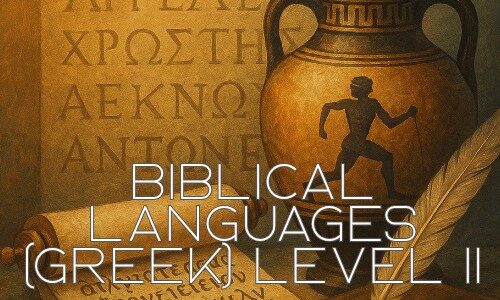Students use specific biblical books and genres in the original Koine Greek Language to bring their language skills to the next level.
Biblical Languages (Greek) – Level II
Level: Doctoral
Course Length: 10 weeks (approx. 150–180 hours total if following full module path)
Delivery Mode: Competency-based, self-paced with required final exam
Course Overview
This course is the second in the Koine Greek sequence, designed to bring students from intermediate reading proficiency to advanced competency suitable for doctoral research and exegesis. Students will read extended passages from selected biblical books in their original Greek, focusing on genre-specific features and exegetical issues. Emphasis is on syntax, discourse analysis, and theological interpretation, equipping students for scholarly engagement with the New Testament text.
The course is competency-based:
-
Students may complete all modules and translation exercises to prepare for the final exam, or
-
If they are already proficient at this level, they may skip directly to the final competency exam.
Competency is demonstrated through translation, parsing, and exegetical analysis of selected Greek texts.
Learning Outcomes
By the end of this course, students will be able to:
-
Translate extended passages from the Greek New Testament with accuracy.
-
Parse and explain advanced verb forms (participles, infinitives, subjunctives, imperatives).
-
Analyze syntax, clauses, and discourse structures.
-
Interpret Greek texts across multiple biblical genres (narrative, epistolary, poetry, apocalyptic).
-
Conduct theological exegesis directly from the Greek text.
Weekly Breakdown (10 Weeks)
Weeks 1-2: Review & Transition to Advanced Syntax (20–24 hours)
-
Review of Level I grammar and vocabulary.
-
Introduction to participles and infinitives.
-
Competency: Translate sentences using participial and infinitival constructions.
Weeks 3-5: Subjunctives, Imperatives, and Conditional Sentences (36–45 hours)
-
Use of subjunctive in purpose and result clauses.
-
Imperatives in ethical instruction.
-
Greek conditional clauses (first–fourth class).
-
Competency: Parse and translate complex clauses accurately.
Weeks 6-8: The Gospel of John (Narrative & Theology) (36–45 hours)
-
Selected readings: John 1, John 3, John 15.
-
Johannine vocabulary and theology (logos, belief, eternal life).
-
Competency: Translate and exegete theological narrative in Greek.
Weeks 9-11: Pauline Letters (Romans, Galatians) (36–45 hours)
-
Extended readings from Romans 3–5, Galatians 2–3.
-
Focus: justification, faith, law.
-
Competency: Translate Pauline argumentation and analyze discourse flow.
Weeks 12-14: Pauline Letters (Philippians, Ephesians) (36–45 hours)
-
Readings: Philippians 2 (Christ hymn), Ephesians 1 (blessing passage).
-
Hymnic and theological discourse in Paul.
-
Competency: Recognize poetic/creedal structures in Pauline Greek.
Week 14-17: General Epistles (Hebrews, James, 1 Peter) (36–45 hours)
-
Hebrews 1–2 (Christology and OT quotations).
-
James 2 (faith and works).
-
Competency: Translate and exegete mixed styles (homily, paraenesis).
Week 18-20: Apocalyptic Genre (Revelation) (36–45 hours)
-
Readings: Revelation 1, 5, 21.
-
Symbolism, visions, and syntax in apocalyptic literature.
-
Competency: Translate and interpret apocalyptic imagery in Greek.
Week 21-23: Greek Poetry & Hymns in the NT (30–36 hours)
-
Christological hymns and doxologies (Phil. 2, Col. 1, John 1).
-
Poetic parallelism and rhetorical devices.
-
Competency: Recognize and analyze poetic Greek forms.
Week 24-26: Discourse Analysis & Exegesis Methods (35–45 hours)
-
Cohesion and coherence in Greek discourse.
-
Analyzing argumentation and narrative flow.
-
Competency: Apply discourse analysis to a full NT passage.
Week 27-28: Integration & Competency Exam Prep (24–30 hours)
-
Comprehensive review of syntax, translation, and exegesis.
-
Integration of theological themes across genres.
-
Final Competency Exam (required): Students must translate, parse, and exegete selected passages across at least three genres (narrative, epistolary, apocalyptic/poetic).
Assessment
-
Competency Exam (100%): Students will translate and exegete assigned passages, demonstrating mastery of advanced Koine Greek and exegetical method.
-
Optional formative assessments: translation logs, parsing drills, exegetical outlines, and practice commentary writing.
Curriculum
- 11 Sections
- 22 Lessons
- Lifetime
- Weeks 1-2: Review & Transition to Advanced Syntax (20–24 hours)Review of Level I grammar and vocabulary. Introduction to participles and infinitives.3
- Weeks 3-5: Subjunctives, Imperatives, and Conditional Sentences (36–45 hours)Use of subjunctive in purpose and result clauses. Imperatives in ethical instruction. Greek conditional clauses (first–fourth class).4
- Weeks 6-8: The Gospel of John (Narrative & Theology) (36–45 hours)Selected readings: John 1, John 3, John 15. Johannine vocabulary and theology (logos, belief, eternal life).3
- Weeks 9-11: Pauline Letters (Romans, Galatians) (36-45 hours)Extended readings from Romans 3–5, Galatians 2–3. Focus: justification, faith, law.3
- Weeks 12-14: Pauline Letters (Philippians, Ephesians) (36-45 hours)Readings: Philippians 2 (Christ hymn), Ephesians 1 (blessing passage). Hymnic and theological discourse in Paul.3
- Week 14-17: General Epistles (Hebrews, James, 1 Peter) (36–45 hours)Hebrews 1–2 (Christology and OT quotations). James 2 (faith and works).3
- Week 18-20: Apocalyptic Genre (Revelation) (36–45 hours)Readings: Revelation 1, 5, 21. Symbolism, visions, and syntax in apocalyptic literature.3
- Week 21-23: Greek Poetry & Hymns in the NT (30–36 hours)Christological hymns and doxologies (Phil. 2, Col. 1, John 1). Poetic parallelism and rhetorical devices.3
- Week 24-26: Discourse Analysis & Exegesis Methods (35–45 hours)Cohesion and coherence in Greek discourse. Analyzing argumentation and narrative flow.3
- Week 27-28: Integration & Competency Exam Prep (24–30 hours)Comprehensive review of syntax, translation, and exegesis. Integration of theological themes across genres.3
- Final: Keeping the Fire: A Lifelong Vocation of Reading, Exegesis, and ProclamationKeeping the Fire: A Lifelong Vocation of Reading, Exegesis, and Proclamation2
Instructor

